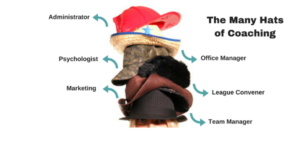 “How do you manage your many hats while balancing coaching duties?
“How do you manage your many hats while balancing coaching duties?
Do you find the day to day management of your club or team takes away from your coaching?
How would you change it?”

Coaches Association of Ontario
Fostering Team Harmony
One of the most satisfying experiences in sport or any other domain is being a member of a team that gets along well and works as a cohesive, collaborative unit. When you live, work, and play together in harmony, the chances of enjoying the journey and achieving mutually beneficial goals increase significantly. By committing yourself to interact in simple, positive ways that make teammates feel valued, appreciated, respected, and supported, you go a long way toward improving team spirit, harmony, and performance. […]
When Olympic and professional team performance enhancement consultant Cal Botterill studied the link between mood and performance in highly skilled team athletes, he discovered that team harmony was a key factor in performance. Each athlete’s mood had a direct effect on his or her performance, and athletes on the road often cited positive interaction with their coaches, roommates, and teammates as having a positive influence on their mood and performance.
Some of the Olympic and professional teams I have worked with have had more than their fair share of disharmony and interpersonal conflicts. Some team members felt ignored or left out, some athletes believed that the coach did not respect them or believe in them, and some team members withdrew emotionally or physically from the group. […]
The root of many interpersonal conflicts within team contexts is a lack of commitment to the overriding team mission, a lack of awareness of other people’s feelings, or sometimes a misinterpretation of the actions or intentions of a teammate, colleague, or coach.
Merely being together at meetings, work, practices, training camps, games, competitions, or team parties does not necessarily increase mutual liking or performance harmony among team members. For a genuine positive team spirit to develop and grow, individuals must commit to a common mission or goal and be linked in some positive interdependent way so they know that they have to rely on and help one another to have a chance of achieving their individual and collective goals.
Harmony or compatibility sometimes flows or grows naturally among members of a team. When this ideal circumstance is not present, it is important to discuss the commitment required from everyone on the team to put the bigger mission above any conflict or disharmony so that everyone gives his or her best and supports one another to achieve a worthy, higher-level goal. When all team members make a decision to be supportive, remain flexible, be their best, find good qualities in their teammates, and work together to accomplish mutually beneficial goals, collectively they put their team on the path to harmony and excellence.
Open communication is an important step in preventing and solving conflicts or problems among team members. Respecting another person’s needs, feelings, and perspective is difficult when you do not know or understand what they are. It is never too early or too late to move along a more positive path, turn a negative into a positive, transform a wrong into a right, or turn an error into a positive lesson. The best time to begin this performance- and life-enhancing process is right now.
From In Pursuit of Excellence, Fifth Edition by Terry Orlick
Copyright © 2017 by Human Kinetics Publishers, Inc. Excerpted by permission of Human Kinetics, Champaign, IL. Available to order from Human Kinetics Canada at www.HumanKinetics.com or by calling 1-800-465-7301.
